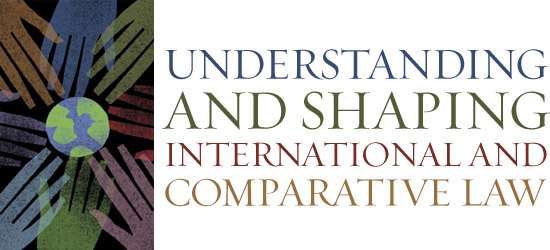
International and comparative law faculty members provide a world of expertise
By Kathleen Kocks
The research, scholarship, and teaching of members of GW Law’s international and comparative law faculty cover a variety of subjects, ranging from international business law to comparative criminal procedure and comparative civil procedure to international trade law. This is the second article in a series that focuses on GW’s international and comparative law faculty members.

|
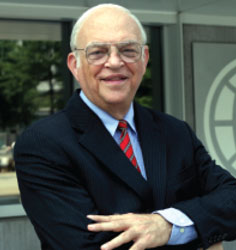
John Andrew Spanogle Jr.
Claire Duggan
|
John Andrew “Andy” Spanogle Jr.
William Wallace Kirkpatrick Research Professor of Law
When John A. “Andy” Spanogle Jr. finished law school at the University of Chicago in 1960 and began teaching law, he took a path that didn’t surprise many people.
“I began my law career as a research assistant for one of the grand old men of the law, Karl Llewellyn. He created the Uniform Commercial Code in 1949, which is used today in 49 U.S. states,” Spanogle begins. “Because of my work with him, I was typecast as a commercial guy. I spent the next 20 years doing domestic law reform, commercial and consumer. Then I got support to do some international aspects of commercial law and spent the next 20 years doing international business law reform. Today, everything I do is business law.”
The William Wallace Kirkpatrick Research Professor of Law, Spanogle began teaching at GW in 1987. He brought to the Law School a pedigree resume.
His career includes teaching at several universities, working on a wide range of special projects, drafting or co-drafting several statutes, and writing more than 50 publications on commercial and consumer law. His more recent projects involve helping the Kosovo government establish a computerized business registry and supporting the Iraqi Governing Council in updating Iraq’s commercial code provisions. However, his most enjoyable job was at the University of Maine, where from 1963 until 1974 he helped establish a new law school.
Looking at international business law today, Spanogle is most intrigued by changes in foreign direct investment and by the emergence of e-commerce.
“The changes are wonderful,” Spanogle says. “In the 1980s, when we taught foreign direct investment, which involves corporations merging with foreign entities or acquiring or building new plants abroad, we taught about the restrictions on those deals. That kind of thing has mostly gone away. Today, you teach how to maximize the incentives that foreign countries give you for bringing a plant to their country. The whole attitude of governments has changed remarkably.”
Regarding e-commerce, Spanogle sees its emergence as the largest issue within his area of law. What he finds most interesting is how different countries or regions are reacting to e-commerce legally.
“For example, the EU says, ‘This is new; better regulate it to assure it goes as we want it to.’ The Americans say, ‘This is new; we’ll let it go along and if it needs regulation, we’ll do it later,’” Spanogle says.
“With e-commerce you have all the usual sales-contract issues, plus some other legal questions. How can you guarantee the goods will be shipped and received? What if the goods are not as promised? In many cases, you have no idea who sold the goods nor where they come from. What are the rules on all those transactions?” he asks.
“It’s interesting to see how things are protected differently. In Europe, you get a seven-day free trial for anything you buy. We in the United States have some controls, but they are from credit law from the 1970s. If you use a credit card for a purchase, you are pretty well protected, but if you use a cash card, you aren’t so well protected. And if you buy from, say, China, you may not have protections at all. There’s a flock of issues, and the issue of this year may not be the issue of next year. It’s great fun to watch this being developed.”
Another area of international business law that interests Spanogle is how to help small businesses obtain favorable financing by using movable assets as loan collateral. These assets could be the company’s inventory, equipment, accounts, or intellectual property.
“Most civil law systems do not ‘value’ movable assets, so it is not easy to use them as security for loans. But movable assets are what most small businesses have to offer, and if you make it easy for a bank to accept them, you can really help small businesses. I’ve spent a fair amount of time taking those sorts of ideas to foreign countries and arguing for laws to be changed,” Spanogle says.
Regarding his scholastic contributions, Spanogle has authored or coauthored four casebooks. One of them, International Business Transactions, is used in 130 law schools. Spanogle’s other casebooks are International Sales Law, Global Issues in Contract Law, and Consumer Law.
“My books present to students several legal problems, along with the best research materials we can put together, then ask them how to deal with the problems. The leitmotif is: If you are going to work for a merchant, the merchant’s highest priority is for you to keep him out of court. So a transactions practice, which I teach, is an attempt to put together the transaction well enough so that no one has to go to court. I believe that all this can only be taught by presenting problems to students and having them wrestle with those problems themselves.
“I also want my students to learn that international business law is not a zero-sum game. In designing a transaction, there is almost always a win-win proposition if you have the imagination to discover it.”
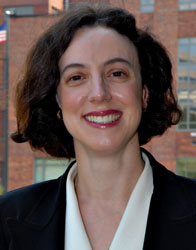
Renée Lettow Lerner
Jessica McConnell
|

|
Renée Lettow Lerner
Associate Professor of Law
Professor Renée Lettow Lerner’s fascination with the judiciary began quite early. “I’ve been interested in judges since I was a little girl,” she says. “When I was 5 years old, my father, Charles Lettow, was a law clerk to Chief Justice Warren Burger, and he took me to his office one weekend. Justice Thurgood Marshall came into the office, and when my father introduced me, I called him Justice Marshmallow. He thought it was very funny.”
This favorable encounter remained with Lerner as she earned her bachelor’s at Princeton University in 1990, a master’s at Oxford University (where she was a Rhodes Scholar studying English legal history), and her JD at Yale University in 1995. In 1993, she got her first legal job, as an intern and then law clerk to Judge Stephen F. Williams of the U.S. Court of Appeals for the District of Columbia Circuit. In 1995, she followed in her father’s footsteps by clerking for a U.S. Supreme Court Justice—Anthony Kennedy. She began teaching at GW in 1997 and worked as a deputy assistant attorney general in the Office of Legal Counsel at the U.S. Department of Justice from 2003 to 2005.
Lerner is an expert in criminal procedure, conflict of laws, English and U.S. legal history, and comparative law, with the judiciary being her main interest. Her present research focus is on 19th-century judges and comparative studies of the judiciary. She is also organizing seminars for France’s Ecole Nationale de la Magistrature (National School for Judges).
At GW, Lerner teaches the history of the common law and is co-authoring a coursebook on the topic. Many of her class discussions revolve around judges and juries, how the judiciary started, its history, and why it is in decline today, she says.
“I’m very interested in the history of judges in this country and in England. How have their powers and their relationship with the jury changed over time? Earlier judges had a much more informal relationship with the jury. At a trial’s end, the judge would often go over the evidence with the jury and sometimes give his opinion. Trials are more formal today. This situation tends to give the lawyers more power over juries,” Lerner says.
“The most important issue I am currently studying is why so few cases today are resolved by trial, either jury or bench. Today we resolve most criminal cases with plea bargaining and on the civil side with settlements. This is different from other systems, especially in Europe, where judges make more decisions. How did we get to the point of not having formal adjudications? What does that mean for litigation?” she asks.
Lerner is also researching the history of the elected judiciary. In the past, judges were appointed, but criticism arose that the governors and legislatures were appointing overly political judges. States then began judicial elections to make judges less political, but some campaign contributors now expect elected judges to be representatives for their interests.
“It gets very complicated watching how these issues are playing out,” Lerner says. “It is interesting to look at how other countries handle judicial selection. For example, in France, judges go through a school, Ecole Nationale de la Magistrature, to become judges and their promotions are based upon evaluations from other judges.”
The French judiciary system gave Lerner her most interesting legal experience. She testified as an expert witness in a French court during the murder trial of a man who had French and American dual citizenship.
“He was prosecuted in France even though the crime occurred in San Diego,” Lerner explains. “French and American investigators were involved, and testifying was completely different from testifying in an American court. The French judge said, ‘What do you have to tell us?’ and I told them. In contrast, in an American court, you are led through testimony and attacked on cross-examination by the lawyers.”
Lerner’s understanding of foreign judiciaries comes into play in the classroom at GW.
“Just because we do it one way in America, that is not the only way it could be done,” she says. “Along the same lines, we can look to the past to see if something was done differently.”

|
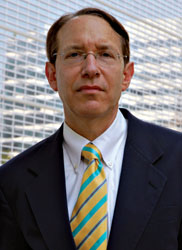
Steve Charnovitz
Jessica McConnell
|
Steve Charnovitz
Associate Professor of Law
We hear a lot today about free trade. An expert in international trade law, Professor Steve Charnovitz knows that the path toward free trade is not easy to navigate. The way is strewn with a multitude of laws and policies from international bodies and sovereign states.
“One of the largest issues is how to promote freer trade in a world of protectionist governments,” Charnovitz states. “It’s been recognized for many centuries that international trade promotes prosperity and benefits societies. Despite this, governments tend to try to restrict trade, and interest groups in the countries try to inhibit trade to protect themselves.
“These policies not only make it harder for developing countries to ship to us but also for us to ship to them, because the countries can’t afford to buy our products,” he says.
Charnovitz’s observations are based upon a career of working in international trade law and studying how that field relates to other areas of international law, such as laws concerning human rights, the environment, competition, and tax.
After receiving his bachelor’s from Yale University, Charnovitz became an analyst at the U.S. Department of Labor, working on international trade, labor, and training projects. He took leave from Labor to earn a master’s in public policy from Harvard University. His next job was as a legislative assistant in the U.S. House of Representatives, working on financial issues for House Speakers Thomas Foley and Jim Wright.
Charnovitz next spent five years as the policy director for the Competitive Policy Council, which he helped organize, and then four years as the cofounder and first director of Yale University’s Global Environment & Trade Study, which studies links between trade and environmental protection. While at Yale, he earned his JD. He then joined the Washington, D.C., law firm Wilmer Cutler Pickering Hale and Dorr, where he advised clients on international trade matters. In 2004, he joined the GW Law faculty.
Charnovitz also serves on the boards of editors of the American Journal of International Law, the Journal of International Economic Law, the Journal of Environment & Development and the World Trade Review, and he is a member of the Council on Foreign Relations. One of his most prominent publications is a collection of his essays in the book Trade Law and Global Governance. He also wrote a chapter in the 2006 book NGO Accountability: Politics, Principles and Innovations, and participated in a United Nations panel on the topic this past January.
Charnovitz’s work and writings have earned high accolades for his analysis of international trade law and its linkage with other types of international law. But when asked about the most enjoyable part of his career, he points to the present.
“I really enjoy most teaching and interacting with the students. Almost all of my present efforts are focused here—researching, writing, or preparing for class,” he says.
Charnovitz teaches international trade law and international business transactions, imparting to students the complex issues involved. He also works diligently to hone his students’ basic legal skills.
“I teach them how to read cases and think through the legal issues—how to solve cases by researching and finding the applicable laws, and teaching what’s important about a lot of doctrine. I also teach oral presentations and call on students in class to improve their confidence, and I supervise a lot of papers that my students write, to improve their writing skills.
“That’s what we do at GW as a law school and that’s what I hope most to accomplish here: help students prepare for their careers.”
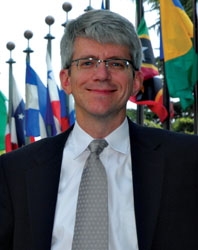
Edward T. Swaine
Jessica McConnell
|

|
Edward T. Swaine
Associate Professor of Law
A relative newcomer to GW Law’s faculty, Professor Edward T. Swaine is applying his expertise not only in the classroom but also at the Law School’s newest center, the Competition Law Center. With a background in international law, foreign relations law, and antitrust law, Swaine was recently chosen as the center’s acting director. The center is being developed thanks to a $5.1-million cy pres award in July made possible by the settlement of a class-action antitrust lawsuit. GW Law alumnus Michael Hausfeld, JD ’69, was lead plaintiff’s counsel in the case.
“We are very excited about the center’s potential,” Swaine explains. “We plan to be involved not only in research but also in sponsoring educational projects and outreach to explore cutting-edge antitrust issues, particularly international antitrust and the role to be played by private enforcement.”
Swaine brings a diverse background to GW’s law faculty. After graduating from Harvard College in 1985, where he was a national college debate champion and a literary editor for the Harvard Lampoon, he earned his JD at Yale University in 1989, where he was editor in chief of the Yale Law Journal. Following a clerkship on the U.S. Court of Appeals for the 5th Circuit with the late Judge Alvin B. Rubin, Swaine served for four years as an appellate staff attorney at the Department of Justice’s Civil Division in Washington, D.C. He then decamped to Belgium, where he worked for several years at the Brussels office of a U.S. law firm practicing in the areas of competition law and European Union law, before becoming an assistant and then associate professor at the University of Pennsylvania’s Wharton School.
In 2005, just before joining GW, Swaine took a leave of absence from Penn to assume a one-year, nonpolitical appointment as the Counselor on International Law at the U.S. Department of State.
“When I went to law school, I was interested in just about everything, and I’ve found that a legal career allows you to keep indulging a variety of interests—and to rub shoulders with a lot of very talented people,” Swaine says.
Although Swaine was first exposed to international legal problems at the Justice Department and in private practice, his interest was piqued by observing some of the issues that came before his wife, who has worked in various international posts in the U.S. government.
“How international law comes to pass and the forms it takes are really fascinating. Customary international law is supposed to be composed of laws that states create to bind themselves, but it’s hard to explain how and why they do, and to what extent states really abide by them,” he says. “As to treaties, figuring out the rules that states follow for creating and enforcing treaties is surprisingly challenging. Sometimes states create treaties with lots of loopholes and without any obvious enforcement mechanisms. There’s a reason they do that, certainly, but what is it and what light does it shed on the way we achieve international legal order?
“Another fascinating thing about international law is that it’s not just made by traditional diplomats but is increasingly influenced and fragmented by international organizations, interest groups, NGOs, and private companies. It’s much the same for antitrust law, which is formulated by actors like the Justice Department, the Federal Trade Commission, U.S. states, foreign countries, private parties, and so forth. In all of these contexts, who has the power to promote the desired policy ends? States are realizing, in the antitrust arena and in many other contexts, that they can’t resolve the problems they face by themselves.”
Asked about the practice experience he enjoyed most, Swaine points to his time in the State Department’s legal adviser’s office.
“I’m a big believer in having career civil-servant, nonpolitical types play a larger, stabilizing role in government; nonpartisan legal advice is particularly important. I think their value has really been borne out by recent events, given the problems the United States has had with its international obligations. So working at the State Department was quite challenging, but it’s filled from top to bottom with very talented and dedicated people, and I learned an incredible amount. It was like a steady diet of difficult law-school hypotheticals, but they were real and sometimes pretty important.
“I also enjoy being a professor and was happy to return to teaching and research,” Swaine adds. “I like the challenge of explaining complex subjects in a simple, but accurate, way. I also enjoy the ability to reflect more deeply on what the right answers are. You always learn something from the discussions, and that helps you learn something about yourself along the way.”
|